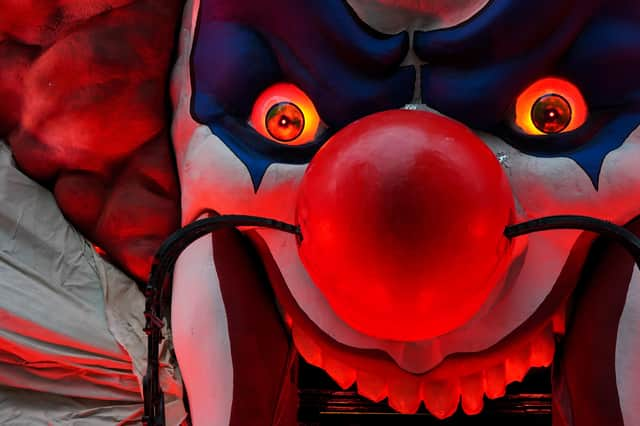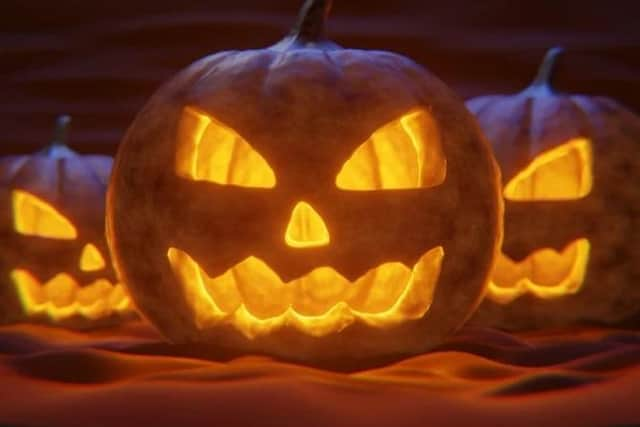Why is Halloween tat the one thing shops aren’t running short of? – David Behrens


The supply of black and orange tat in late October, for people to deck their halls and faces in a futile attempt to convince themselves that Halloween is a real festival, has spiralled out of control in recent years. What began as a half-hearted imitation of American culture popular has become as much a part of the retail calendar as Christmas and – heaven help us – Black Friday.
It’s an irresponsible fad propagated on demanding extortionate prices for masks and costumes which cost pennies to manufacture, from families who can least afford them.
Advertisement
Hide AdAdvertisement
Hide AdThe end result this year will be people who refuse to wear masks while out shopping happily doing so in order to frighten their friends.


It’s not just the seasonal aisles in novelty shops that are full of this rubbish; row after row of real estate in usually respectable outlets is given over to plastic buckets in the shape of pumpkins, which children can fill with sweets that will make them fat. Even the supermarket vegetable racks are full of giant pumpkins you can’t eat, because beneath their skin they are as empty as everything else about October 31. This particular abomination is a crime against cuisine, because proper pumpkins are authentically delicious when baked in a pie – but no-one in Britain knows this because we’ve only ever seen the other kind.
Nor is it just children who are taken in. Grown-up costumes have become increasingly outlandish as the first generation of British kids to have grown up with the charade has taken its traditions with them into adulthood.
Advertisement
Hide AdAdvertisement
Hide AdThe Yorkshire-based supermarket Asda is especially obsessed, asking £15 this year for dolls of a clown on a rocking horse singing a nursery rhyme while its eyes glow red. “Terrify your guest this Halloween” runs the sales pitch. But for what reason, other than the obvious one of exploiting gullible and perhaps impressionable shoppers?
How has our sense of priorities allowed this to happen? Was there a foreman at Felixstowe docks who decided that a container load of pointy hats should have priority over food, furniture and engineering widgets that could have kept the wheels of industry turning? Or did the shops simply have warehouses full of the junk they couldn’t persuade us to buy last year?
Some say that all this is the result of a tide of Americana washing over the British Isles, swept here by satellite TV and the internet, but really it’s as much a product of our own excess. Halloween hysteria belongs in the same category as an England football match or a summer heatwave: any excuse for a party. In the present climate, that’s understandable. But if you really want to celebrate Halloween, you can do so without submitting to the crass commercialisation that goes with it.
Advertisement
Hide AdAdvertisement
Hide AdMuch the same can be said of Christmas, and it raises the question of what sort of a festive season we can expect this year. The latest toys may be in short supply, and we might have to settle for chicken instead of turkey – which is tastier anyway – but there’s little evidence that we will run short of any of the essentials of a proper British blow-out – namely bottles of booze and yards of fairy lights to string out across the garden. Those are already on the shelves next to the plastic Halloween wands, and there seem to be enough of them to take out the national grid.
What we’re seeing is the merger of Halloween, Black Friday and Christmas into one long season, as is the case in America, where the entire period is known simply as “the holidays”. The only difference is that our version takes in Guy Fawkes Night, which is relatively immune to commercialisation because no-one outside Britain knows what it is.
My own family is as complicit in this as everyone else’s. Years ago, Behrens junior told me that autumn was his favourite time of the year. When else could you knock at strangers’ doors and expect to be fed? But he knew better than to drag me to Asda for a £10 bin bag disguised as a fancy dress costume.
Other parents fare less well, and so long as they continue to cough up, retailers will happily take advantage of them. But this year carries with it a caution, and shops would be well advised to take note. It is this: if you can’t sell us what we need, don’t just palm us off with what you need to get rid of.
Advertisement
Hide AdAdvertisement
Hide AdSupport The Yorkshire Post and become a subscriber today. Your subscription will help us to continue to bring quality news to the people of Yorkshire. In return, you’ll see fewer ads on site, get free access to our app and receive exclusive members-only offers. Click here to subscribe.
Comment Guidelines
National World encourages reader discussion on our stories. User feedback, insights and back-and-forth exchanges add a rich layer of context to reporting. Please review our Community Guidelines before commenting.